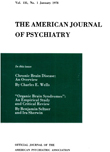PHYSIOLOGICAL RESPONSES TO HEAT STRESS AND ACTH OF NORMAL AND SCHIZOPHRENIC SUBJECTS
Abstract
No statistically significant differences were found in the physiological responses of chronically ill schizophrenics as compared with normal controls and nonschizophrenic patients.
Moderate to severe heat was used for stress. The circulating eosinophils and lymphocytes were measured before, during, and after exposure to heat. The base values for circulating eosinophils and lymphocytes during and after heat stress were also similar in the 3 groups.
In preliminary studies the uric acidcreatinine ratios were also not remarkable.
It was found that even the small dose of 5 mg. of ACTH produced an eosinopenia comparable to that found in normal subjects.
It should be noted that Hoagland and Pincus after studying more patients have concluded that lymphocyte response to ACTH and to heat stress does not reliably differentiate schizophrenics from nonschizophrenics. They have not reported data on eosinophils. However, they found that urinary 17-keto- steroids, sodium, potassium, uric acid, and cortins do differentiate schizophrenics from controls exposed to stress of various kinds and to ACTH.
Access content
To read the fulltext, please use one of the options below to sign in or purchase access.- Personal login
- Institutional Login
- Sign in via OpenAthens
- Register for access
-
Please login/register if you wish to pair your device and check access availability.
Not a subscriber?
PsychiatryOnline subscription options offer access to the DSM-5 library, books, journals, CME, and patient resources. This all-in-one virtual library provides psychiatrists and mental health professionals with key resources for diagnosis, treatment, research, and professional development.
Need more help? PsychiatryOnline Customer Service may be reached by emailing [email protected] or by calling 800-368-5777 (in the U.S.) or 703-907-7322 (outside the U.S.).



